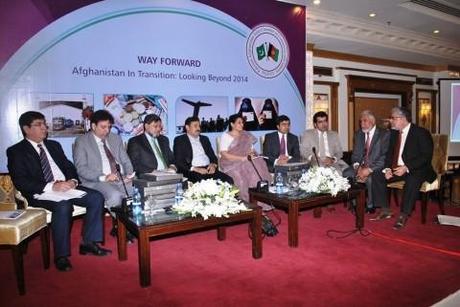 By Huzaifa Shabbir Hussain and Hammad Siddiqui
By Huzaifa Shabbir Hussain and Hammad Siddiqui
As neighbors, Pakistan and Afghanistan have a number of commonalities. Both are predominantly Muslim countries and share similar values, culture, and civilization — as well as a long history of trade through both formal and informal channels. The signing of a new transit trade agreement between Afghanistan and Pakistan in 2010 has been termed as a major diplomatic accomplishment for both countries given the current geo-political environment. However, problems persist, especially in terms ensuring stability and growth in cross border trade and investment.
To help deal with these challenges, members of the business community from both countries formed the Pakistan and Afghanistan Joint Chamber of Commerce & Industry in February 2012, with support from the British High Commission (BHC) and CIPE.
The core objective of the chamber is to facilitate peace prospects and strengthen economic and trade ties between the two countries. Since its establishment, PAJCCI has been aggressively pursuing its goal to ensure linkages between the business communities on both sides of the border.
The exchange of delegations, B2B and matchmaking sessions, circulation of trade and business opportunities, and annual conference have become vital avenues for enhancing bilateral ties between the two countries. The platform has also provided an opportunity to raise the voice of business community on both sides of the border, encouraging government officials to make changes that enhance cross-border trade and investment.
Starting from an infant stage, the chamber has successfully achieve some significant milestone in a short span of time:
- A stakeholders meeting was conducted to review APTTA 2010, the agreement governing cross-border trade.
- In January 2013, an Economic Cooperation Conference was organized in Islamabad whereby all related officials and ministries across the border were invited.
- PAJCCI again revisited APTTA 2010 in August 2013 to present an actual scenario to Ministry of Commerce and FBR.
- 5 Trade delegations, 3 Annual Conferences, 3 newsletters, and two trade surveys have been published.
- PAJCCI Pakistan & Afghanistan together have more than 450+ members.
Augmenting the effort recently, on April 30, PAJCCI held its third annual conference on improving economic relations between the two countries titled “Way-Forward – Afghanistan in Transition: Looking Beyond 2014.” More than 100 people representing the private sector and government officials from both countries attended the event.
During the conference, discussions included the latest developments in terms of a newly elected government in Pakistan, elections in Afghanistan, and the withdrawal of US troops. PAJCCI has organized the forum to delve into significance of such challenges and upcoming strategies to help stabilize the economic and peace developments throughout the region via Pakistan and Afghanistan corridors.
“PAJCCI is an important forum but strategizing is more important and due execution is critical. This forum should resolve issues one by one and facilitate trade and transit across the border,” said Abbas Khan Afridi, Federal Minister for the textile industry in Paksitan. He further highlighted that immediate reforms may be devised and implemented to establish confidence.
During the discussion, Janan Mosazai, Ambassador of Afghanistan to Pakistan, appreciated role of PAJCCI and noted that embassy and consulates of Afghanistan and Pakistan are currently issuing 6 month multiple-entry visas to the Pakistani business community based on PAJCCI’s recommendation, and he committed to extending 12-month visas to PAJCCI members.
Mosazai said that Bilateral Trade, Transit trade and investment are the key priorities for the government of Afghanistan in economic cooperation and deepening engagement with Pakistan. The commitment is not only of the government of Afghanistan but it reciprocates from the Pakistani side.
The President & Co-President of the chamber proposed to the Ministry of Commerce and the Directorate General for Transit Trade to resolve transit issues immediately, and a committee may be formulated on urgent basis to deal with tactical and operational issues. The recommendation was well accepted and proposal is sought from PAJCCI so that a plan to deal with the issue may be submitted to the Ministry of Commerce and the Federal Board of Revenue.
CIPE intervention through technical assistance in this project is now showing dividends and a private sector of both sides is now strongly bonded to assist business community of both countries in the years to come.
Huzaifa Shabbir Hussain is Assistant Program Manager for CIPE Pakistan. Hammad Siddiqui is Deputy Country Director for CIPE Pakistan.

